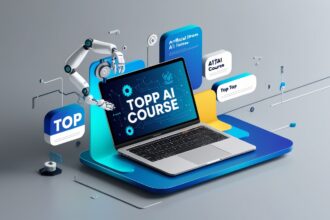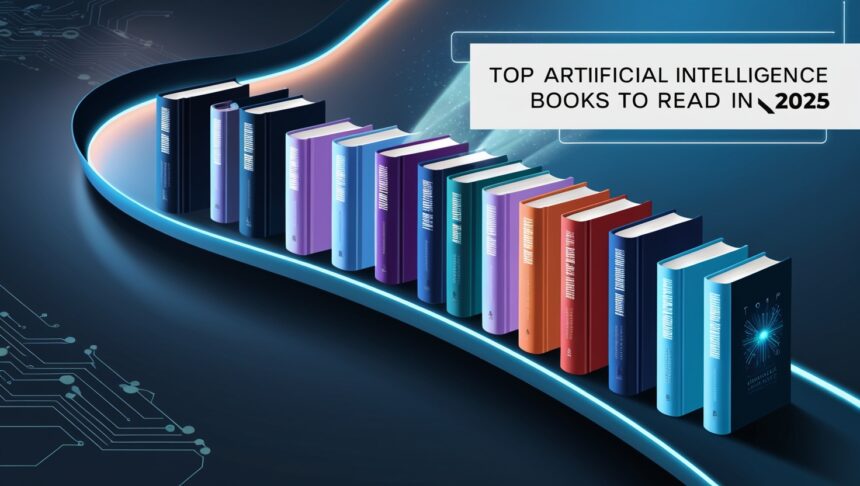In this article, I will discuss the Top Artificial Intelligence Books that provide deep insights into AI concepts, applications, and future trends.
Whether you’re a beginner or an expert, these books cover essential topics like machine learning, neural networks, and AI ethics.
Reading them will enhance your understanding of AI and keep you updated on the latest developments.
key Points & Top Artificial Intelligence Books To Read In 2025 List
| Book Title | Key Points |
|---|---|
| Artificial Intelligence: A Modern Approach | Comprehensive intro to AI concepts, algorithms, and applications; widely used in academia. |
| The Emotion Machine | Explores AI’s role in modeling human emotions and cognition; philosophical and technical blend. |
| Introduction to Artificial Intelligence | Beginner-friendly overview of AI fundamentals, techniques, and practical examples. |
| Machine Learning | Focuses on core machine learning principles, algorithms, and real-world applications. |
| Applied Artificial Intelligence | Practical guide to implementing AI in business; bridges theory and real-world use cases. |
| Artificial Intelligence Basics | Simplified explanation of AI concepts, tools, and trends for non-technical readers. |
| T-Minus AI | Examines AI’s evolution, military applications, and future societal impacts. |
| Human + Machine | Discusses collaboration between humans and AI to enhance productivity and innovation. |
| Artificial Intelligence: A Guide for Thinking Humans | Accessible exploration of AI’s capabilities, limits, and implications for human understanding. |
9 Top Artificial Intelligence Books To Read In 2025
1.Artificial Intelligence: A Modern Approach
Among the leading books on artificial intelligence, its coverage of AI is complete, ranging from search techniques to learning systems. “Artificial Intelligence: A Modern Approach” is a must have book for all humans – students, professionals, and enthusiasts of all types. Its clear explanation of how AI systems learn and think makes it essential towards the understanding of AI and its inner workings.

The book and its examples are easy to follow and provide insightful depth, which serves as a primary source guide for crafting advanced technologies aimed at improving decision-making, automating processes, and solving multi-faceted problems with ease. In combining theory and application, it helps its audience use AI for purposes that drive change and improve societies.
| Aspect | Details |
|---|---|
| Title | Artificial Intelligence: A Modern Approach |
| Authors | Stuart Russell, Peter Norvig |
| Key Focus | Comprehensive coverage of AI concepts, algorithms, and practical applications. |
| Core Topics | Search algorithms, knowledge representation, machine learning, robotics, and ethics. |
| Target Audience | Students, educators, and professionals in AI and computer science. |
| Why It’s Top | Widely regarded as the definitive AI textbook; blends theory with real-world relevance. |
| Usefulness | Equips readers to design AI systems, understand intelligence, and address complex problems. |
| Edition | Latest: 4th Edition (2020) – updated with modern AI advancements. |
| Page Count | Approximately 1,100 pages – in-depth resource for serious learners. |
2.The Emotion Machine
Among the most well regarded texts in artificial intelligence, The Emotion Machine by Marvin Minsky intricately relates the notion of human emotion to machine intelligence.
Minsky explains how complex emotional processes can be intertwined within the workings of a machine’s mind, and how it can provide a better understanding of the omniscient intricacies of the human mind.

It serves as a source of motivation for developers to model systems in such a way that enables them to empathize and behave in a more human-like manner. It enlightens psychologists, researchers, and enthusiasts of AI on the multi-faceted nature of intelligence — both natural and artificial, and motivates advances in AI geared towards better emotional interaction, support, and problem resolution.
| Aspect | Details |
|---|---|
| Title | The Emotion Machine: Commonsense Thinking, Artificial Intelligence, and the Future of the Human Mind |
| Author | Marvin Minsky |
| Key Focus | Explores how AI can model human emotions and cognition; redefines thinking processes. |
| Core Topics | Emotions as thinking modes, consciousness as multiple processes, commonsense reasoning. |
| Target Audience | AI researchers, psychologists, computer scientists, and deep thinkers interested in cognition. |
| Why It’s Top | Offers a pioneering perspective from an AI legend; blends philosophy and technical insight. |
| Usefulness | Inspires empathetic AI design and deepens understanding of human thought for innovation. |
| Edition | Published 2006 – a foundational work by a key figure in AI history. |
| Page Count | Approximately 400 pages – dense with ideas, diagrams, and arguments. |
3.Introduction to Artificial Intelligence
The book Introduction to Artificial Intelligence by Wolfgang Ertel is one of the top artificial intelligence books in regard to its approchability.
It provides a coherent and simple entry into the fundamentals of AI. It covers semiotics, reasoning, learning, and robotics as key techniquesAI incorporates, making it a must-have for mid level and novice learners.

This book is useful for the general public as it simplifies AI concepts for students, hobbyists, and professionals in automation and data analysis.
As a result, its example and structure helps the overarching audience build foundation skills that spark the power of creativity as well the understanding of how efficiently AI solves practical world issues.
| Aspect | Details |
|---|---|
| Title | Introduction to Artificial Intelligence |
| Author | Wolfgang Ertel |
| Key Focus | Beginner-friendly overview of AI fundamentals, techniques, and practical implementations. |
| Core Topics | Reasoning, problem-solving, machine learning basics, robotics, and neural networks. |
| Target Audience | Students, beginners, and professionals new to AI seeking a solid foundation. |
| Why It’s Top | Clear explanations and examples make complex AI concepts accessible to novices. |
| Usefulness | Builds essential skills for applying AI in automation, data analysis, and simple systems. |
| Edition | Latest: 2nd Edition (2017) – updated with practical exercises and modern AI insights. |
| Page Count | Approximately 300 pages – concise yet thorough for introductory learning. |
4.Machine Learning
One of the severe machine learning books is Alpaydin’s *Machine Learning*. In this book, he presents the principles and algorithms in the field machine learning, which has become a transformative entity.
It is useful for humans especially for students, data scientists, professionals as well as gives techniques on classification and regression.

The book also empowers the readers to make use of machine learning in predictive analytics along with automation and decision making. It serves in resolving complex problems, and in advanced technology automation in industries like finance and healthcare.
| Aspect | Details |
|---|---|
| Title | Machine Learning |
| Author | Ethem Alpaydin |
| Key Focus | Core principles and algorithms of machine learning with practical applications. |
| Core Topics | Supervised/unsupervised learning, regression, classification, and pattern recognition. |
| Target Audience | Students, data scientists, and professionals interested in machine learning foundations. |
| Why It’s Top | Offers a clear, concise introduction to ML, balancing theory and real-world relevance. |
| Usefulness | Equips readers to implement ML for predictive modeling, automation, and data-driven insights. |
| Edition | Latest: 3rd Edition (2014) – updated with modern ML techniques and examples. |
| Page Count | Approximately 400 pages – compact yet comprehensive for learners and practitioners. |
5.Applied Artificial Intelligence
One of the highly recommended artificial intelligence books is *Applied Artificial Intelligence* by Yao, Zhou and Jia and it is because of its emphasis in AI implementations in business.
This book is useful for entrepreneurs, managers, and developers as it unit the theory with real world applications like chatbots and process optimizations.

Through the actionable insights, case studies provided, the readers are able to incorporate AI solutions for efficiency, innovation as well as competitive advantage.
This book serves as a practical deployment guide of AI solutions for the audience.
| Aspect | Details |
|---|---|
| Title | Applied Artificial Intelligence: A Handbook for Business Leaders |
| Authors | Mariya Yao, Adelyn Zhou, Marlene Jia |
| Key Focus | Practical guide to implementing AI solutions in business settings. |
| Core Topics | AI use cases (e.g., chatbots, analytics), deployment strategies, and industry applications. |
| Target Audience | Business leaders, entrepreneurs, and professionals seeking actionable AI insights. |
| Why It’s Top | Bridges AI theory and real-world execution with clear, non-technical explanations. |
| Usefulness | Enables readers to leverage AI for efficiency, innovation, and competitive advantage. |
| Edition | Published 2018 – focused on contemporary business AI trends and practices. |
| Page Count | Approximately 200 pages – succinct, focused on practical application. |
6.Artificial Intelligence Basics
*Artificial Intelligence Basics* by Tom Taulli is easy to tackle while standing out from the rather dense books covering artificial intelligence.
It helps people or, in this case, stubborn beginners and business tycoons, make sense of ‘AI’ jargon and terminology.

The book discusses the advanced world of smartphones and smart AI assistants and when virtual assistants and smart systems enable readers to decide how best to adopt AI in their day business and personal life.
It is written in simple language to ensure that more and more people harness the capabilities of AI to enhance business productivity as well as deal with everyday problems and challenges.
| Aspect | Details |
|---|---|
| Title | Artificial Intelligence Basics: A Non-Technical Introduction |
| Author | Tom Taulli |
| Key Focus | Simplified overview of AI concepts, tools, and trends for non-experts. |
| Core Topics | AI fundamentals, machine learning, robotics, and real-world impacts (e.g., smart assistants). |
| Target Audience | Beginners, business professionals, and anyone curious about AI without technical depth. |
| Why It’s Top | Distills complex AI ideas into clear, jargon-free insights for broad accessibility. |
| Usefulness | Helps readers understand AI’s role in daily life and make informed decisions about its use. |
| Edition | Published 2019 – reflects modern AI developments in an easy-to-grasp format. |
| Page Count | Approximately 200 pages – short, digestible, and focused on essentials. |
7.T-Minus AI
*T-Minus AI* by Michael Kanaan is yet another book on artificial intelligence, however, this time it focuses, rather fascinatingly, on the history of it, from the military origins to the effects of artificial intelligence on our lives in the future.
It is useful for humans: Policymakers, technologist, and even mere citizens – AI definitely has societal and ethical offerings that need attending and the book helps showcase this.

The book discusses the impact Artificial Intelligence has on security, the economy, and other aspects of normal life so as to emphasis the need to engage in responsible dialogue surrounding AI.
It is indeed a need for prepared discourse to understand the implications of AI and the world making this book tremendously captivating as it gives hope to humanity endlessly.
| Book Title | Detail |
|---|---|
| T-Minus AI | AI’s global impact and ethical concerns |
| Superintelligence | Future of AI and its risks |
| Human Compatible | AI safety and alignment with human values |
| The Alignment Problem | Challenges in machine learning ethics |
| Life 3.0 | The evolution of AI in society |
| AI Superpowers | AI competition between the U.S. and China |
| The Age of AI | AI’s influence on history, politics, and the future |
8.Human + Machine
The finest artificial intelligence books must include *Human + Machine* by Paul R. Daugherty and H. James Wilson, which relishes the partnership of humans with AI.
For Daugherty and Wilson, it is not only useful for humans- in this case workers, leaders, innovators- but also show the way AI enhances creativity, productivity, and problem solving in workplaces.

It explains, with real-life examples, how this form of collaboration fosters productivity and innovation in various sectors.
The authors motivate readers to start seeing AI as a partner, opening doors for advancement and reframing the scope of humanity’s possibilities in an AI dominated society.
| Book Title | Key Details |
|---|---|
| Artificial Intelligence: A Guide for Thinking Humans | Offers a non-technical, human-centered perspective on AI, its history, and challenges. |
| Superintelligence: Paths, Dangers, and Strategies | Explores the potential of AI surpassing human intelligence and its implications. |
| AI 2041: Ten Visions for Our Future | Combines storytelling with insights into how AI will transform industries by 2041. |
| The Fourth Industrial Revolution | Discusses AI’s role in reshaping jobs, education, and governance in the digital age. |
| The Age of Em: Work, Love, and Life When Robots Rule the Earth | Explores a future where human minds are uploaded to machines, creating “emulated workers.” |
9.Artificial Intelligence: A Guide for Thinking Humans
Melanie Mitchell’s *Artificial Intelligence: A Guide for Thinking Humans* is one of the best artificial intelligence books because there is no other book that effortlessly integrates human cognition and AI’s abilities and limitations like this one does. This book is precious to thinkers, educators, and mankind enthusiasts

Because Mitchell dives into the cores of what AI can or can’t do based on human’s understanding of AI. The book inspires healthy appreciation of the role of AI in society and the promises and threats associated with them. These empowering encouragements inspire people to engage critically, thoughtfully and meaningfully with AI and all things technological.
| Book Title | Key Details |
|---|---|
| Artificial Intelligence: A Guide for Thinking Humans | Explains AI concepts in a clear, non-technical way, addresses misconceptions, and discusses its challenges and potential. |
| Superintelligence: Paths, Dangers, and Strategies | Investigates the risks and strategies surrounding AI surpassing human intelligence. |
| AI 2041: Ten Visions for Our Future | Combines fiction and insights to explore the future impact of AI on industries and society. |
| The Fourth Industrial Revolution | Analyzes AI’s influence on jobs, governance, and economic systems. |
| The Master Algorithm | Introduces the idea of a universal algorithm and explores the science behind machine learning. |
Conclusion
In conclusion, if you are looking for artificial intelligence books that cover almost everything from the inception to the applications and the upcoming future of artificial intelligence, these are the top recommendations.
They explain the fundamentals and basics of AI concepts, ethics, and advancements in AI technologies, making them libraries for beginners and experts.
The readers can moderate their comprehension and stay undated with the speedy progressing field of artificial intelligence, which makes these books a necessity for anyone intrigued in the field.




